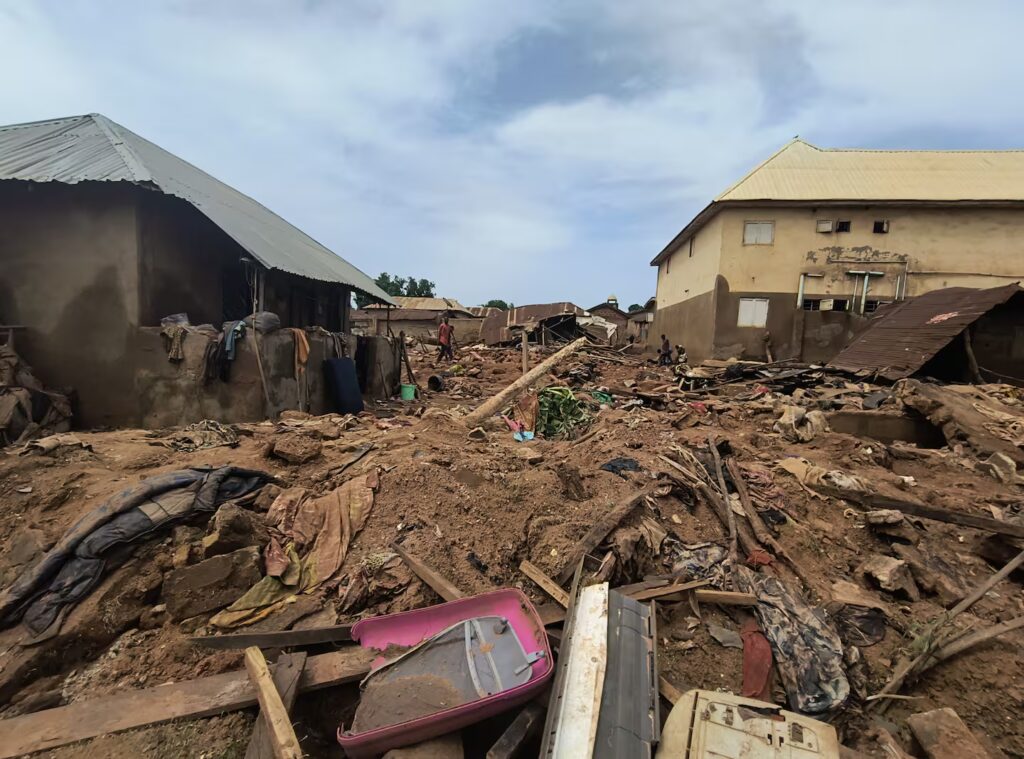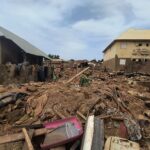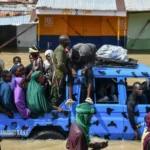At least 200 people are feared dead and thousands displaced after flash floods submerged the northern Nigerian town of Mokwa in Niger State, turning homes, lives, and farmlands to wreckage.
Officials have now suspended rescue operations, saying there is little hope of finding more survivors.
“We are only exhuming bodies buried beneath the rubble,” said Musa Kimboku, deputy chairman of Mokwa local government, in an interview with the Associated Press.
Overnight rains which began early on Thursday, May 29, triggered the floodwaters that ripped through the farming and trade hub, situated near the banks of the River Niger. It took less than five hours for the community to be overwhelmed, with homes swallowed, roofs submerged, and roads cut off.
Emergency responders say over 3,000 people have been displaced and more than 500 households destroyed.
The floods are being described by survivors and local leaders as the worst in living memory.
“I have never seen anything like this in my 42 years of existence,” said Adamu Usama, a civil engineer who lost ten in-laws to the flood. “We saw the water carrying people but we couldn’t help. We don’t know how to swim.”
One resident, Adamu Yusuf, told AFP he lost nine family members. He was found unconscious and hospitalised. “Only one body has been recovered,” he said, standing on the ruins of what used to be his home.
Debris, Decay and Disbelief
Residents who survived the deluge now speak of stench and silence. Many are picking through debris, and salvaging what little they can. Puddles, carcasses and cracked walls are all that remain of entire neighbourhoods.
With floodwaters receding, the air is thick with the smell of decomposing bodies. Volunteers, including children as young as 10, continue to dig through the rubble. Some bodies have been found nearly 10 kilometres away, swept into the Niger river.
Despite President Bola Tinubu’s assurances of federal intervention and deployment of emergency teams, residents say aid remains scarce on the ground.
Warnings Ignored, Infrastructure Blamed
Several contributing factors have been identified.
Floodwaters had been accumulating for days behind clay mounds formed by an abandoned railway track. Normally, culverts would have allowed water to drain, but they were blocked by debris. When the earthen walls finally gave way, a deadly surge tore through the town.
Experts and residents say this was a disaster waiting to happen.
Jibril Muregi, chairman of Mokwa local government, told Premium Times that long-delayed flood control infrastructure could have helped prevent the catastrophe. Others blame poor town planning and a lack of preparedness, despite the Nigerian Meteorological Agency issuing flood warnings for Niger state just days before.
“Anybody that tells you this is the number of people that died is just guessing,” said Adamu, a local shopkeeper. “We’ve buried 153 already, but many are still under the debris,” he said.
Climate Change
Seasonal flooding is not new to Nigeria, but the scale and frequency have worsened.
Last year, floods killed over 320 people across 34 of the country’s 36 states, according to the National Emergency Management Agency. Experts say a deadly mix of climate change, deforestation, poor urban planning and blocked water channels is compounding the risk.
“This is not just a weather problem. This is a governance problem,” said climate risk researcher Hauwa Bello. “Where early warnings are issued but not acted upon, we turn climate impacts into human tragedies.”
Mokwa’s plight also underscores a growing pattern in Nigeria and much of West Africa: the most vulnerable communities are the least prepared for extreme climate shocks and the least supported when disaster strikes.
As Mokwa mourns its dead and searches for the missing, thousands are left homeless, waiting for food, shelter and a plan for recovery. Meanwhile, their grief and loss are compounded by silence from many in power.
Mohammed Umar Bago, governor of Niger state, is reportedly on pilgrimage in Saudi Arabia. His deputy has visited the site. But for many, what they need is more than condolences. They need real help.











